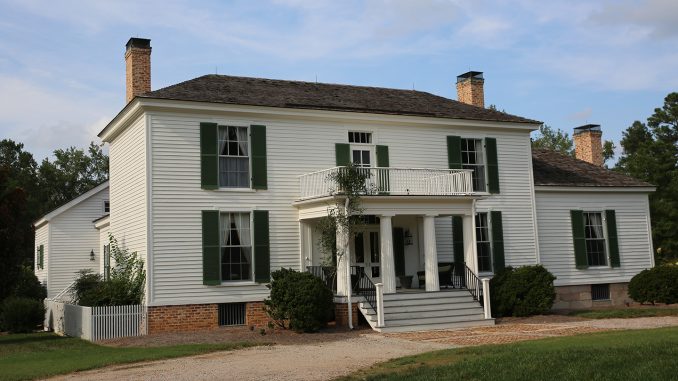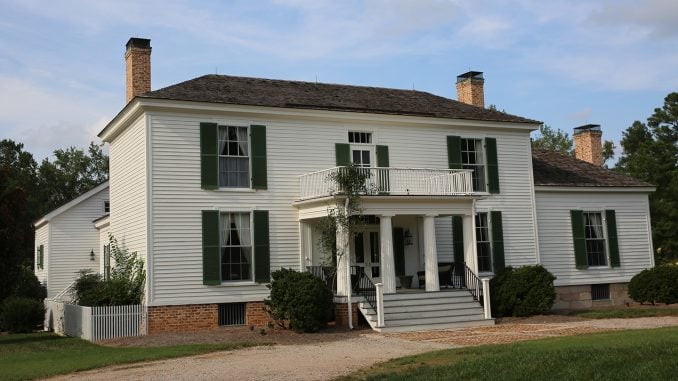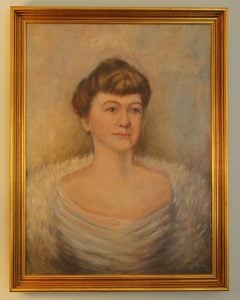

(Lauren Rose | North State Journal)
By Dan Reeves
For the North State Journal
KNIGHTDALE — When I started thinking about a “spooky” topic for the October issue, my faculties registered absolutely nothing. My belief in the supernatural goes about as far as what I took from Ghostbusters 2, and I spook easily. Ask anyone. Then it struck me — the ghosts of Midway Plantation. What better stories to tell for Halloween than those from a historic N.C. landmark, rife with accounts of visitors from the other side? What I discovered and came to earnestly believe is that the departed do come back — not always to wreak havoc and terrify unwelcome occupants — but to keep an eye on things, bless and protect the living, and remind us all that death is not the end.
Originally constructed by David Hinton in 1848 on what used to be the old wagon trail to Raleigh (now HW 64), Midway Plantation has been in the Hinton family’s possession dating back to a land grant in the late 1700s.
Its colorful past, present and dreams of the future unfold exquisitely in the 2007 documentary, Moving Midway, which captures the physical relocation of the existing structures to make way for urban sprawl barreling through the once-idyllic sanctuary near Knightdale. Endlessly entertaining and thought provoking, the film dissects the rich history of plantation life — warts and all — through the experience of the Silvers and their relatives. Lauded film critic, documentarian, and Hinton-descendent Godfrey Cheshire brings to the story the experience of his newly-discovered cousin, Professor David Hinton, an African American living in New York. The harsh reality of slavery and the progeny thereof ads sobering perspective, realizing the Afro-European identity of the American South.
I reached out to old family friends, Charlie and Dena Silver, who’ve been residing at Midway since 2000 to hear first-hand what they’ve witnessed.
With complete familiarity and ease, Charlie and Dena Silver describe their kinship with the supernatural. Expecting bloodcurdling tales of horror and fright, the opposite came to the surface. The casual mention of a Confederate soldier
marching across the living room to the haunting chimes of a player piano, or Charlie all-of-a-sudden remembering to tell Dena about the lady he sees perched on their toilet almost regularly. It’s all just business as usual. The paranormal activity is frequent but sporadic, with little rhyme or reason.
“They go to the mountains in the summer, because it’s too hot here,” chuckles Dena. “If there’s something we haven’t done, or should have done, they’ll turn something over, open a door and slam it, something to get our attention. It’s our job to figure out what it is.”
Here are just a few short tales from Midway:
The Night Alone
Aside from the fact that Dena was undergoing radiation treatment for breast cancer, it was a night like any other. She performed her nightly ritual of bidding goodnight to all the ghosts around the house and climbed into bed. Just as she began to fall into a deep sleep, a bright aura of white light appeared hovering next to her bed. In that sliver of a second between dozing off and actual rest, Dena said, “I could feel someone pulling the covers over my body as if to tuck me in. Not to strangle me, but to tuck me in… and it startled the daylights out of me.” Jarred by the incident, Dena reached out to Charlie’s Aunt Sis for comfort and council. After a cautionary command to get away from “those people” Sis recalled that the bedroom was where her mother slept. What she saw and felt was her mother tucking her in, telling her everything was going to be ok. And it was. Dena is cancer free and has been for years.
The Nice Lady
Dena and Charlie’s three-year-old granddaughter, Tilly, would squirm and wiggle like kids that age do. Frequently, she would calm herself by marching through the breezeway to talk by the window with someone or something no one else could see or here. Tilly would always set a place for tea when socializing with her invisible friend, and invite her wherever she went. Everyone would ask who it was Tilly was talking to. Her answer always: The nice lady. “Young children, as they say, are open to interaction with the spirits.” Years later, a young couple renting the house had a small child. The mother would come into the bedroom in the morning to find her standing up in her crib, facing the window, talking to someone she called “the nice lady.”
The Little Boy
While making repairs to the main house, Dena and Charlie moved into a smaller building on the property. In a trembling tone Dena recalls, “This little boy might be in the bathroom or he would pop up at the end of the bed at night.” Over the years, the translucent image of a boy from the waist up materialized to others who stayed in the small house, leaving all to question the boy’s identity. Dead in the winter of 1908, tragedy struck Midway Plantation when three 15-year-old boys attempted to walk on Hinton Pond. All three fell through the ice and drowned. In a photograph of the teens as young children, one by the name of James Hinton bears a striking resemblance to the child seen wandering and standing throughout the little house.
Miss Mary and the Wren

(Lauren Rose | North State Journal)
Charlie’s great, great aunt, Miss Mary, had no children and was to leave her will to his father, but it was nowhere to be found. “We found her will courtesy of a little wren that kept flying against the closet,” says Silver. Over the years, the wren has symbolized the spirit of Miss Mary. Flying in the front door, inspecting each room to meet her standards, and flying right out the back, the wren continues to maintain order and keep a watchful eye on the property.
Charlie knew well that for her entire life, Miss Mary rarely allowed entry into her beloved, and pristinely-kept, parlor. Their first Christmas living at Midway, ignoring a warning from Charlie, Dena placed a giant tree adorned with bulbs in what she thought would be the perfect location to place a holiday centerpiece. Late that night, a crash loud enough to shake the bed upstairs jerked Dena and Charlie out of their slumber. What they discovered in the parlor would teach them an unforgettable lesson from Miss Mary. The massive tree, screwed tightly into a stand with water just the night before lay flat the parlor floor. All but one bulb shattered completely, the tree out of its stand. Never again would anyone, family or not, disturb Miss Mary’s precious parlor.
What the Silvers shared with me was so much more than their personal accounts of ghostly encounters. More than anything, I took from my conversation that they chose to believe that those we’ve lost can, will, and want to remain in our lives. As Dena so eloquently put it, “I believe they go to heaven, but their spirit doesn’t leave. They get a hall pass for the day to come snoop around and make sure everyone’s ok.”



